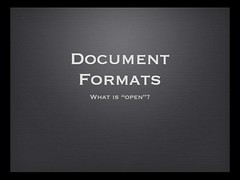
It happened. Maybe I should say, it finally happened. The Microsoft Office Open XML format has been accepted by ISO as a true Open Standard. You can even get it for free here. This means that this file format has now the same open status as the allready open format ODF, used in Openoffice.org and Sun Staroffice. Let’s see if this is a good thing…
First of all let’s look at the perspective of Microsoft. It’s good to no longer loose against ODF because OpenXML wasn’t open. This means that Microsoft – or rather it’s file formats for it’s Office platform – can now better compete against ODF and the accompanying office-products. It also means that a lot of other developers might start developing tools around this format. Interesting things would be converters between different formats and generators for MSOffice-compatible files. This would help the Microsoft Office user as compatibility issues would be less a problem.
On the other hand, this might be not so good for Microsoft since it’s now much easier to build quality support for the Microsoft Office fileformats in competing Office products. This means that migration becomes less of a hassle and the vendor-lock-in that Microsoft held for over a decade is more or less lost. Just note that a migration means a lot more than just fileformat-incompatibility and conversion issues… It’s still not easy to do!
For the general public this is generally a good thing. It means choice and choice is good. This also applies to corporations and non-profit institutions.
Now what does this mean for the competitors. This is not very clear yet. On the one hand it is now possible to create better compatibility with Microsoft’s File Formats which serves their customers well. On the other hand Microsoft has a competitive advantage (or less of a disadvantage) when it comes to the openness of their platform and fileformats. The future will have to teach us what the outcome will be…
I know that a lot of people have been trying hard to stop the process of standardization of OpenXML. They clearly lost their fight. They now need to move on and accept defeat and start to retake some positions in this new reality. In the end one should wonder if it’s such a bad thing that fileformats that were proprietary now become open. Wether this harms any competition, we will know soon enough. At least it’s interesting to follow the events closely…





